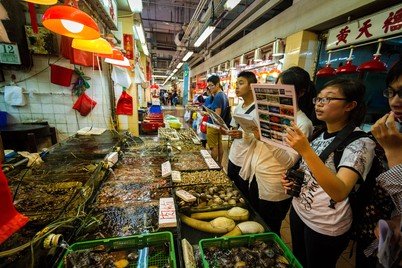Inspiring Green Action
Philosophy and science have found a meeting point in a project that encourages secondary school students to appreciate Hong Kong's biodiversity and environment more deeply, and to multiply that impact by getting their families and secondary schools to follow their lead.
Philosophy and science have found a meeting point in a project that encourages secondary school students to appreciate Hong Kong's biodiversity and environment more deeply, and to multiply that impact by getting their families and secondary schools to follow their lead.
The "Take Action! Youth Biodiversity Conservation Leadership Training Scheme" offers participants field trips, games and debates that encourage them to consider the complicated nature of environmental issues and how they can make a difference.
It began as an idea in the Department of Philosophy, where Dr Alexandra Cook has long been interested in green issues both personally and academically. Her MPhil student Kathleen Ho was researching the shift in environmental concerns in Hong Kong over the years, and wondered how she could contribute. When they realised KE funding was available, they spotted an opportunity to act.
Kathleen recruited two other postgraduate students, Xoni Ma from the Kadoorie Institute who was researching environmental education in secondary schools, and Li Pui-sze from the Faculty of Science, who was looking at plant systematics and could provide scientific input to their ideas. "We figured that with this combination of skills and interests, they could really do something important," said Dr Cook, who is their faculty adviser.
"Take Action!" was run in 2014 and again this year by the Kadoorie Institute and gives students first-hand experience of nature, such as visits to Tai Po Kau Nature Reserve and dolphin watching. Participants debate such things as the pros and cons of development and the impacts of overfishing and seafood consumption, and are encouraged to discuss the issues with their families.
"One thing that struck me was how the students went home and converted their families to eat sustainable fish. In the past the approach has usually been to just tell participants to eat sustainable fish. So individual people were touched by this programme beyond the immediate recipients of the training," Dr Cook said.
At the end of the programme, the students drafted and implemented conservation plans for their schools, doing such things as setting up an eco-corner, labelling tree species around their school, building a birdhouse from waste materials, and negotiating with school management for more field trips.
Some 63 Form 4-6 students from 16 secondary schools attended the programme's four full-day sessions in 2014 and about 80 students did so this year. The programme was supported by the Conservancy Association, the Agriculture, Conservation and Fisheries Department, as well as a total of 42 HKU students who assisted in running the sessions. Plans are underway to run more sessions in 2016.
Dr Alexandra COOK (School of Humanities) and team members - Ka Yan HO (School of Humanities), Kwan Ki MA (The Kadoorie Institute) and Pui Sze LI (School of Biological Sciences), received the Faculty Knowledge Exchange Award 2015 of the Faculty of Arts for 'Take Action! Youth Biodiversity Conservation Leadership Training Scheme'.



